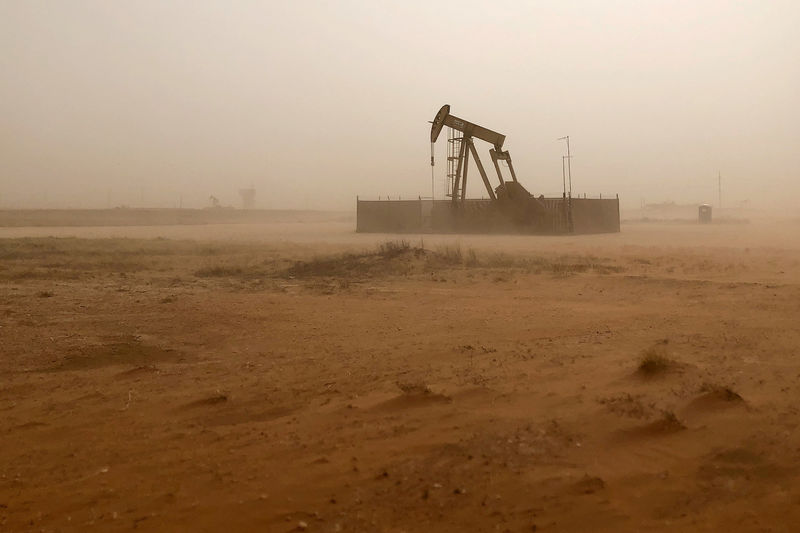By Liz Hampton
HOUSTON (Reuters) - Major U.S. energy companies including Plains All American Pipeline (N:PAA), Hess Corp (N:HES) and Kinder Morgan Inc (N:KMI) are among many seeking exemptions from steel-import tariffs as the United States ratchets up trade tensions with exporters including China, Canada and Mexico.
There have been nearly 21,000 requests overall for exclusions submitted to the U.S. Commerce Department since the Trump administration imposed levies this year. Of those, more than 500 petitions involve pipes and related materials.
Initial decisions are expected this month, offering the first clues as to how the administration will balance an agenda favoring oil and gas exports while also supporting the U.S. steel and aluminum industries.
For the energy industry, the potential for relief has taken on added importance after China surprised markets last week by proposing 25 percent levies on about $1 billion a month in U.S. oil imports in retaliation for U.S. tariffs.
The pipeline industry could face higher costs from tariffs as about 77 percent of the steel used in U.S. pipelines is imported, according to a 2017 study for the pipeline industry. Benchmark hot-rolled U.S. steel coil prices are up more than 50 percent from a year ago, according to S&P Global Platts.
Pipelines from the nation's largest oilfield in west Texas to the Gulf Coast are nearly full, depressing crude prices as output is projected to rise by about 850,000 barrels per day this year, and significant projects are not expected to be completed until at least next year.
Plains sought a tariff exclusion for its 500-mile Cactus II oil pipeline, which will connect West Texas oil fields to export docks near Corpus Christi, Texas. This month, it expects to receive its first material from Corinth Pipeworks SA, a Greek manufacturer, according to a Commerce Department filing.
"We think tariffs would be unjust, but we can tolerate" them, Greg Armstrong, chief executive of Plains All American Pipeline (N:PAA), told investors this month, adding that tariffs and import quotas could hurt U.S. production growth.
No U.S. mills can produce pipe with the specifications needed for Plains' line. Only three mills in the world make such pipe, and delivery delays could exacerbate constraints, the company wrote in its petition, affecting the price of oil from the largest U.S. oilfield.
The 585,000-barrel per day line is due to start flowing next year, just as analysts warn a bottleneck of crude could force some producers to shut in production.
Total pipeline, rail and local refining capacity from the Permian Basin oilfield in March was 3.175 million barrels per day (bpd), according to energy intelligence service Genscape, just shy of the oilfield's roughly 3.3 million bpd output in June.
Rival pipeline operator Kinder Morgan also wants an exclusion for its $1.75 billion Gulf Coast Express natural gas pipeline from West Texas to the U.S. Gulf Coast. It ordered 47 percent of specialized pipe needed for the project from Turkish steel maker Borusan Mannesmann.
Only one U.S. producer could meet Kinder Morgan's needs, but it could not meet the volume required within the necessary timeline, Kinder said in a filing.
The United States is committed to acting on exclusion requests within 90 days of a petition being posted for comments, a Commerce Department spokesman said. The United States could offer refunds on tariffs paid since a petition became active.
For companies unwilling to take the risk of having a request denied, "it may mean cutting back or pushing the timeline out farther" for some projects, said Brigham McCown, former head of regulator U.S. Pipeline and Hazardous Materials Safety Administration.
Oil and gas producer Hess cited safety concerns in a request to use Japanese pipe for its Stampede offshore project in the U.S. Gulf of Mexico.
"Without the ability to use this product, we will not be able to guarantee corrosion resistance in deepwater operations using other currently available steel products - potentially compromising both safety and environmental protection," the company wrote in its filing.
Between 2015 and 2016, the U.S. imported between about $5 billion and $8 billion in steel line pipe, valves and fittings for the pipeline industry, according to a study by consultancy ICF for the American Petroleum Institute.

"There's lots of concern that the increased cost in pipe will increase the costs for our oil," said North Dakota Senator Heidi Heitkamp, who wants Congress to vote on tariffs imposed under national security grounds. "You pull on one string in international trade and it unravels in ways you could not have predicted."